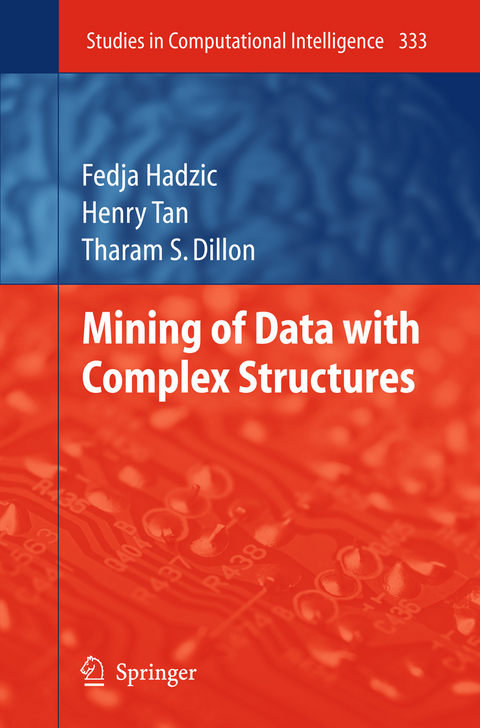
Mining of Data with Complex Structures
Springer Berlin (Verlag)
978-3-642-26703-1 (ISBN)
Mining of Data with Complex Structures:
- Clarifies the type and nature of data with complex structure including sequences, trees and graphs
- Provides a detailed background of the state-of-the-art of sequence mining, tree mining and graph mining.
- Defines the essential aspects of the tree mining problem: subtree types, support definitions, constraints.
- Outlines the implementation issues one needs to consider when developing tree mining algorithms (enumeration strategies, data structures, etc.)
- Details the Tree Model Guided (TMG) approach for tree mining and provides the mathematical model for the worst case estimate of complexity of mining ordered induced and embedded subtrees.
- Explains the mechanism of the TMG framework for mining ordered/unordered induced/embedded and distance-constrained embedded subtrees.
- Provides a detailed comparison of the different tree mining approaches highlighting the characteristics and benefits of each approach.
- Overviews the implications and potential applications of tree mining in general knowledge management related tasks, and uses Web, health and bioinformatics related applications as case studies.
- Details the extension of the TMG framework for sequence mining
- Provides an overview of the future research direction with respect to technical extensions and application areas
The primary audience is 3rd year, 4th year undergraduate students, Masters and PhD students and academics. The book can be used for both teaching and research. The secondary audiences are practitioners in industry, business, commerce, government and consortiums, alliances and partnerships to learn how to introduce and efficiently make use of the techniques for mining of data with complex structures into their applications. The scope of the book is both theoretical and practical and as such it will reach a broad market both within academia and industry.In addition, its subject matter is a rapidly emerging field that is critical for efficient analysis of knowledge stored in various domains.
Introduction.- Tree Mining Problem.- Algorithm Development Issues.- Tree Model Guided Framework.- TMG Framework for Mining Ordered Subtrees.- TMG Framework for Mining Unordered Subtrees.- Mining Distance-Constrained Embedded Subtrees.- Mining Maximal And Closed Frequent Subtrees.- Tree Mining Applications.- Extension of TMG Framework for Mining Frequent Subsequences.- Graph Mining.- New Research Directions.
| Erscheint lt. Verlag | 25.2.2013 |
|---|---|
| Reihe/Serie | Studies in Computational Intelligence |
| Zusatzinfo | XX, 328 p. |
| Verlagsort | Berlin |
| Sprache | englisch |
| Maße | 155 x 235 mm |
| Gewicht | 534 g |
| Themenwelt | Informatik ► Datenbanken ► Data Warehouse / Data Mining |
| Informatik ► Theorie / Studium ► Künstliche Intelligenz / Robotik | |
| Mathematik / Informatik ► Mathematik ► Angewandte Mathematik | |
| Technik | |
| Schlagworte | Bioinformatics • Complex Structures • Computational Intelligence • Data Mining • extension • Knowledge • Racter |
| ISBN-10 | 3-642-26703-3 / 3642267033 |
| ISBN-13 | 978-3-642-26703-1 / 9783642267031 |
| Zustand | Neuware |
| Informationen gemäß Produktsicherheitsverordnung (GPSR) | |
| Haben Sie eine Frage zum Produkt? |
aus dem Bereich


